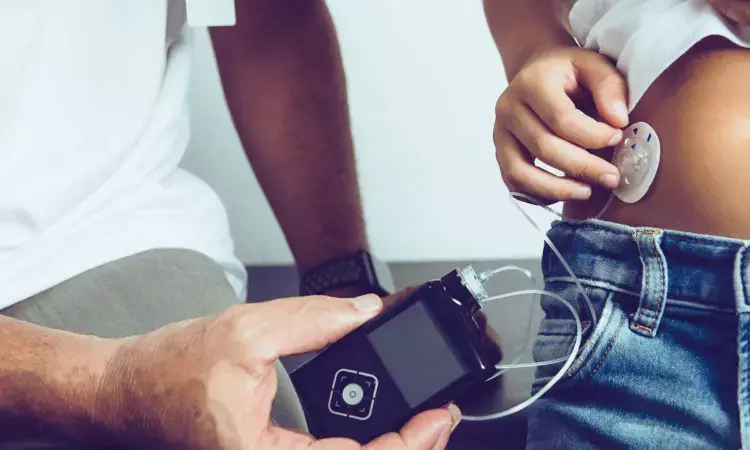- Home
- Medical news & Guidelines
- Anesthesiology
- Cardiology and CTVS
- Critical Care
- Dentistry
- Dermatology
- Diabetes and Endocrinology
- ENT
- Gastroenterology
- Medicine
- Nephrology
- Neurology
- Obstretics-Gynaecology
- Oncology
- Ophthalmology
- Orthopaedics
- Pediatrics-Neonatology
- Psychiatry
- Pulmonology
- Radiology
- Surgery
- Urology
- Laboratory Medicine
- Diet
- Nursing
- Paramedical
- Physiotherapy
- Health news
- Fact Check
- Bone Health Fact Check
- Brain Health Fact Check
- Cancer Related Fact Check
- Child Care Fact Check
- Dental and oral health fact check
- Diabetes and metabolic health fact check
- Diet and Nutrition Fact Check
- Eye and ENT Care Fact Check
- Fitness fact check
- Gut health fact check
- Heart health fact check
- Kidney health fact check
- Medical education fact check
- Men's health fact check
- Respiratory fact check
- Skin and hair care fact check
- Vaccine and Immunization fact check
- Women's health fact check
- AYUSH
- State News
- Andaman and Nicobar Islands
- Andhra Pradesh
- Arunachal Pradesh
- Assam
- Bihar
- Chandigarh
- Chattisgarh
- Dadra and Nagar Haveli
- Daman and Diu
- Delhi
- Goa
- Gujarat
- Haryana
- Himachal Pradesh
- Jammu & Kashmir
- Jharkhand
- Karnataka
- Kerala
- Ladakh
- Lakshadweep
- Madhya Pradesh
- Maharashtra
- Manipur
- Meghalaya
- Mizoram
- Nagaland
- Odisha
- Puducherry
- Punjab
- Rajasthan
- Sikkim
- Tamil Nadu
- Telangana
- Tripura
- Uttar Pradesh
- Uttrakhand
- West Bengal
- Medical Education
- Industry
Automated Insulin Delivery Boosts Glycaemic Control in Type 1 Diabetes: Real-World Australian Study

Australia: A recent multicentre audit conducted in Queensland, Australia, has provided compelling real-world evidence supporting the use of automated insulin delivery (AID) systems in managing type 1 diabetes mellitus (T1DM). The study, published in Diabetes, Obesity and Metabolism, evaluated the impact of AID therapy on glycaemic control in both metropolitan and regional healthcare settings, revealing significant improvements in blood glucose metrics.
The researchers reported, "The meta-analysis of 16 trials found that fully AID improved time-in-range (TIR) by 10% compared to conventional insulin therapy in type 1 diabetes, with greater benefits seen in younger individuals and those with shorter disease duration. However, fully AID was less effective than hybrid systems (−3.05% vs 17.44% TIR improvement)."
The research involved a retrospective analysis of 158 adults with T1DM who were initiated on AID therapy across three sites—Logan (metropolitan), Mackay, and Townsville (regional). AID systems integrate continuous glucose monitoring with automated insulin dosing, aiming to maintain blood glucose levels within a target range. Although clinical trials have shown promise, the study sought to assess how the technology performs in routine care, especially in less urban areas where access to specialized diabetes services may be limited.
The study led to the following findings:
- Average time-in-range (TIR) improved from 53.4% to 70.0% after up to 12 months of AID therapy.
- Time spent in hyperglycaemia (>13.9 mmol/L) decreased from 18.7% to 8.4%.
- Mean HbA1c levels dropped from 8.62% to 7.34%.
- 64.1% of participants achieved HbA1c levels below 7.5% at follow-up.
- 42.7% of participants reached the recommended HbA1c target of below 7%.
- There were greater HbA1c reductions in patients with higher baseline HbA1c values.
- Improvements in glycaemic control were consistent across different AID systems and geographic locations.
The study findings echo previous meta-analyses, which have shown that fully automated insulin delivery systems improve TIR by about 10% compared to traditional insulin methods. Interestingly, the recent audit also supports the idea that younger individuals and those earlier in their disease course may gain more pronounced benefits from AID.
"The real-world audit demonstrates that AID systems offer a significant advancement in diabetes management, especially in bridging the urban-rural divide in care delivery. As these systems continue to evolve, ongoing research is essential to maximize their accessibility and long-term benefit for all patients living with T1DM," the authors concluded.
Reference:
Konantambigi A, Wang W, Boggild D, Rana A, Syphers L, Presley C, Cummins C, Malabu U, Hawke K, Shenoy V, Puri G, Deshmukh H. Real-world evaluation of automated insulin delivery therapy in type 1 diabetes: A multicentre study across regional and metropolitan Queensland, Australia. Diabetes Obes Metab. 2025 May 28. doi: 10.1111/dom.16485. Epub ahead of print. PMID: 40432403.
Dr Kamal Kant Kohli-MBBS, DTCD- a chest specialist with more than 30 years of practice and a flair for writing clinical articles, Dr Kamal Kant Kohli joined Medical Dialogues as a Chief Editor of Medical News. Besides writing articles, as an editor, he proofreads and verifies all the medical content published on Medical Dialogues including those coming from journals, studies,medical conferences,guidelines etc. Email: drkohli@medicaldialogues.in. Contact no. 011-43720751


